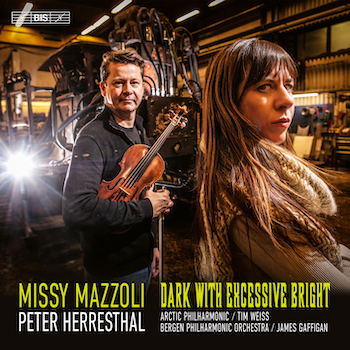Classical Album Review: Missy Mazzoli’s “Dark with Excessive Bright”
By Jonathan Blumhofer
Missy Mazzoli’s scoring is generally airy and virtuosic, yet Dark with Excessive Bright doesn’t seem to add up to more than the sum of its parts.

Recordings of Missy Mazzoli’s stage works and chamber music dot the contemporary music discography but, until now, there was no extended survey of her orchestral output. Dark with Excessive Bright rectifies this neglect up to a point.
Running just over an hour, its timing is generous enough, though, oddly, nearly half the album’s duration is devoted to two separate performances of the title track. The conundrum doesn’t stop there. The score itself, which takes Milton’s description of God from Paradise Lost as its title, was originally for double bass and orchestra. Here, though, we get it both times in arrangement for solo violin, once with orchestra, once with string quintet.
What’s going on? That’s a great question.
It might be less of an issue if Dark with Excessive Bright made for a truly compelling violin concerto. As it is, the fiddle writing boasts folkish (and often stratospheric) melodic lines plus cadenza-like episodes. Mazzoli’s scoring is generally airy and virtuosic, yet the piece doesn’t seem to add up to more than the sum of its parts, even with Peter Herresthal’s accomplished delivery (twice!) of its demanding solo line.
Perhaps the original version is stronger. Or a greater degree of structural imperative would have helped.
Either way, the chamber arrangement comes off better than the orchestral one (the last is executed with polish by the Bergen Philharmonic Orchestra and James Gaffigan). With the quintet, though, the intensity of the performance is, if anything, ratcheted up thanks to the reduced contingent. But, in both, the mix of sputtering figures, unmemorable melodic lines, and formal ambiguity only carries the piece so far.
More impressive is Mazzoli’s Vespers for Violin, for amplified violin and electronics. Here, Herresthal dispatches his part with haunting, glowing tone. The combination of elements, too, is enchanting, sort of the aural equivalent of floating, disembodies, through a great Medieval cathedral.
Likewise gripping is These Worlds in Us, Mazzoli’s first orchestral score. Unfolding essentially like a set of variations, its pulsing, turbulent textures and captivating sense of musical space are strongly etched by Tim Weiss and the Arctic Philharmonic.
That conductor and orchestra turn in similarly devoted performances of Sinfonia (from Orbiting Spheres) and Orpheus Undone, the latter a suite drawn from Mazzoli’s 2019 ballet of the same name. That neither of those works boast the immediacy of These Worlds is a pity, yet moments in each – like the dancing impetus at the end of Sinfonia (not to mention the inclusion of a Lion’s Roar in the instrumentation) and the delicate, high-piano/percussion scoring in the second movement of Orpheus – are stirring.
Jonathan Blumhofer is a composer and violist who has been active in the greater Boston area since 2004. His music has received numerous awards and been performed by various ensembles, including the American Composers Orchestra, Kiev Philharmonic, Camerata Chicago, Xanthos Ensemble, and Juventas New Music Group. Since receiving his doctorate from Boston University in 2010, Jon has taught at Clark University, Worcester Polytechnic Institute, and online for the University of Phoenix, in addition to writing music criticism for the Worcester Telegram & Gazette.
Tagged: Bergen Philharmonic Orchestra, Bis, Dark with Excessive Bright, Missy Mazzoli
